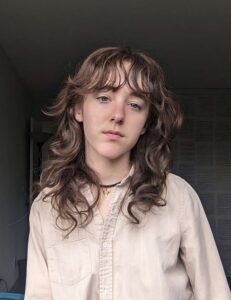Content warning: gun violence
It was Christmas Eve and Ogre had a semi-automatic pistol in her waistband. Her hand flinched towards it every other minute—when a car door slammed around the corner, when Liq let out a muffled laugh, when a neighbour’s dog whined at its leash.
She stumbled on the back porch, boot cracking against a fibreglass planter, hand roping around my elbow. I jerked away from her.
“Get off,” I whispered.
“Shut up,” she hissed back. Sweat beaded her hairline, nose wet, breath soggy. She looked like dew.
It was a quiet night. Someone had forgotten to turn off the Christmas lights. A stranger had climbed a ladder to put them there. I wondered if they’d been scared as they clipped each strand between the roof and shingles, trying not to fall.
The sliding patio door clicked open. Arson’s fingers waved at us. Quietly, we slipped into the dark like eels.
Later, I would think about that image: What did we look like to the man who found us in his home, who yelled, whose arms jogged against his body like a rubber band when he fired? Maybe we looked scared. Maybe we looked beautiful: bodies stark under the ceiling light like the contrast had been turned too high. Maybe we looked like we had always wanted to be caught.
Four teenage girls with Sharpie tattoos, collar bones, hipless.
◊ ◊ ◊
It was a cursed winter, people said. Unusually warm, even for California. They said: Girls of this generation are falling like flies—to peer pressure, gangs, degeneration. Parents aren’t paying attention. They said: Someone is bound to get killed. When it was all over—blood cleaned from the Christmas tree skirt, files dismissed, TV reporters moving on to grizzlier stories—I wanted to shout in their faces: No, listen to me! We were free.
◊ ◊ ◊
I saw them for the first time at the supermarket on El Camino. A gang of girls with armfuls of tangerines and teddy bear crackers. They were old and young at once: pink mittens sticking out of oversized coats, eyebrow piercings and dirty jokes. I watched them as I followed my mother past the produce: their poky elbows, the way they threw their arms around each other’s shoulders, mouths snapping at ears, coyote-like. In their wake, I slipped a tangerine into my pocket.
The next time I saw them, I was alone at the roller rink, disco ball sharding light. I was sullen and removed—my mother’s idea, a way to discard me for the evening—until I saw them. They made themselves visible: pearl necklaces and purple eyelashes, mouths like teenage widows. They shoved each other around the rink until a girl fell forwards and half her shirt shredded behind her like a speech bubble, still clasped in another’s hand.
When they unlaced their skates and left the rink, I followed them. They cluttered around a bus stop and exchanged pieces of gum. A double-decker arrived. I knew my mother would be arriving soon, but I was half-disgusted, half-enchanted, and I couldn’t go back. I paid for the bus fare with pocket change.
They watched me as I took a seat across from them and stared out the window. In its reflection, I looked green.
I glanced over, skittish, afraid. One of them was staring at me.
“Who are you?” She had golden hoop earrings and a choker. She looked around sixteen.
I was still figuring that out. I said: “I’m Babe.” It was true. That was my name. But she laughed and said: “It works.” They introduced themselves, then, going down the line: Exponent, Liq, Battery. Each name cut the mouth on its way out.
The girl who’d spoken to me went last. “They call me Ogre.” She leaned forward in her seat. “So, tell me. You wanna be with us?”
I wasn’t sure what she meant. Did she mean now? Forever? I imagined our bodies being ceremonially buried in a row, each gravestone engraved with the words: one of the girls.
I nodded despite myself. I was fourteen and I wanted everything.
She slid a piece of paper and pen from her back pocket. “Take this,” she said. “Write the worst thing you can think of. Then give it to him.” She nodded to a man sitting at the back of the bus with a gristled chin and crossed arms.
Ogre giggled behind her cupped mouth. It was a girlish gesture and I was struck by the way she was so many things at once.
“What if I don’t do it?” I said. I wanted to be defiant. I wanted to be brave.
Immediately, I felt regret. The look that crossed her face wasn’t unkindness or disappointment, but boredom. She crossed one leg over the other and coughed into her elbow. “Haven’t you ever wished you could say something bad? Something terrible. Just once. We don’t let ourselves, but we all want to.” She leaned back and tipped her head against the bus window. “I’m giving you the freedom to do it.”
I knew, in other words, she meant: If you’re not brave enough, you’re not one of us. I didn’t know why, but I couldn’t let that happen.
I squeezed the pen, my hand sweaty. The girls had resumed talking, six or seven of them, voices shuffling over each other like a deck of cards. I swallowed hard. And then, trying not to tremble, I began to write as legibly as possible. The words filled up the paper, ink blotted and smeared, until there was no white space left.
◊ ◊ ◊
My mother worked in an office, my dad at a fishery. When they were both home, they were always on the phone, buying into pyramid schemes, yelling across the house at each other about the November grocery bill. More often than not, they didn’t notice me.
When I got home that night, my mother looked up from the couch. “I waited for you.” She set the remote down. “I waited for over an hour.” She blinked, fish-like, without looking away. “You don’t realize, do you, that your actions have consequences?”
I scratched my forearm.
“I almost called the cops.” Her tone was blank, defeated.
“Oh.” I was still spinning. Ogre and the rest of us had flooded off the bus, screeching and clutching each other. It had taken an hour and a half to walk home, lightheaded, dizzy, limbs unscrewed. The whole time, I’d been replaying the moment I saw them at the roller rink. I remember their faces, even now, the dim light and the shine of their sweat.
My mother’s jaw tightened. “Do you have anything you want to say?”
I ran my tongue along my bottom teeth. She had never looked at me that way before, like I held something from her that she wanted. The channel of our interactions had switched to a new frequency and I was the one holding the remote.
I felt so visible.
“No,” I said, and I left for my room.
◊ ◊ ◊
The girls congregated in the junkyard behind the Sikh temple. They sat on abandoned cars in the hot winter sunlight. Everything burned to touch.
There were fifteen girls total, though we were never together all at once. Liq: box-green hair, watched YouTube documentaries. Paradox: perpetually dressed in cheetah print, addicted to Kool-Aid. Battery: a kleptomaniac.
Ogre stood out from the rest. She had an ugliness that she made sexy. She had yellow teeth, wore tank tops with pit stains and cargo shorts with dead wildflowers looped through the belt buckles. It seemed as though her clothing was always falling off—shorts sliding down, spaghetti straps halfway off her shoulder. She seemed aware of this falling apart but rarely went to the effort of fixing it.
I knew the least about Arson. She wore a cross around her neck. The girls said she was really religious, but not in a Baptist way. That she prayed to a version of God only she knew. Others said she just prayed to her mother. When she talked, which was rare, her voice was thin, stripped like a wire or a laser beam.
Arson took care of Ogre when she came home bleeding. That happened sometimes, though we all pretended it didn’t. There was a tenderness in Arson’s gestures that I didn’t have words for.
I began to visit them once or twice a week, then more frequently, until I biked or bussed every day after school. I stayed until the sky went dark and we watched the Sikh architecture bulb against the night.
◊ ◊ ◊
Four weeks after meeting the girls, they told me they had somewhere to take me. The night air clawed my throat like a fishbone. I wore my largest jacket, not as a defense against the chill, but for the way it made me look bulky, a bruise.
Arson drove us through the hills with the radio turned to pop hits. We cranked down the windows and yelled at strangers.
Twenty minutes later, we arrived at a massive boulder next to the cliffside. The ground broke off, opening out to the city far below, a million lights. The car doors popped open before Arson had come to a stop.
Girls’ arms snapped up and down, lids cracking off, paint hissing as they began to work. My eyes stung with aerosol and paint dribbled onto my fingers, dyeing the skin neon. As we painted, the air smelled like chemicals and body odour.
We were a unified shape, covering the stone for half an hour until nearby shouts split the air. We scrambled into the car and Arson peeled off. Behind us, the rock bled blue. Most of the messages made no sense to me, phrases that started with “fuck” and ended with words I didn’t know how to pronounce, but I remember the largest words as they bobbed in the rearview mirror: WE ARE HERE.
◊ ◊ ◊
On the weekends, we went roller skating. A couple of girls had been in roller derby and they showed us their tricks: crossovers and hip checks. By the end of the night, we had fishnet burns on our legs. I’d never been so good.
◊ ◊ ◊
My mother stopped asking where I was going. She watched me from the corner of her eye while I made grilled cheese in the kitchen. She would flick off the stovetop once I’d left the room; I was always forgetting. She seemed afraid of me, and maybe she was right to be. I didn’t know what was happening, what things I might accidentally set aflame.
◊ ◊ ◊
In the week before winter break, I spent my days staring out school windows and thinking about the girls. I turned them into characters for creative writing assignments. Teachers told me I could afford to be sparing. I didn’t need to say so much, they said. I didn’t need to prove myself.
Each morning, there was a coldness to the glaring sun, like metal sliding into place. Christmas lights and front lawn decorations looked merciless. Even crystal ornaments could cut.
I reassured myself that we weren’t a gang, not really. We called ourselves one, gave each other nicknames, chopped up our hair and wore combat boots, but at the end of the day we slunk in through our parents’ back doors and took showers and finished our homework. We pretended to ignore the pink elastics in each other’s braces, the smell of lavender shampoo. The worst I saw the girls do was burn an abandoned house or graffiti the Walmart downtown. They shoplifted bags of sour keys and black panties. It was petty crime, I told myself. Nothing violent to it.
◊ ◊ ◊
One day during winter break, I arrived at the yard to unusually tense spirits. Battery sat motionless, Paradox swung her legs off the end of a car hood, Liq tied and untied her shoelaces repeatedly.
“What’s going on?” I asked.
“Ogre’s on a field trip,” Liq said.
“What does that mean?”
“She’s breaking into a house.” Arson was doing sudoku, a pencil half-chewed in her mouth. “Her middle school boyfriend’s parents are out of town.”
“Yeah,” Liq interrupted. “But the boyfriend isn’t.”
“Oh.” I sat down next to them.
“She wouldn’t let me go with her,” Arson added. She hadn’t seemed upset at first glance but I could tell by the white cliffs of her knuckles, the hard pebble of her chin.
“It’s been two hours,” Liq added.
“She’ll be okay,” I said. “She’s good at being alone.”
Arson scowled.
We listened to birds call out like scratched glass. I was reminded of a school project I’d done on the California quail two years before. Their call sounds like Chi-ca-go. They only call when separated from the group, or as an alarm for nearby danger.
“There she is!” Someone exclaimed.
Arson’s head snapped up. Ogre was marching across the Sikh parking lot towards us. Suddenly, she thrust both arms in the air. “I did it!”
She showed us her wares: women’s jewelry, Nintendo switch, a gun. My mouth went dry. Everyone else seemed to glance at it, then away, as if it hurt to look at.
“Why the fuck did you get a toaster?” Arson asked. She held the appliance to the streetlight.
“I wanted a toaster!” Ogre replied hotly.
That night, we celebrated. Ogre said she knew a guy who would buy the valuables. We could spend the money on an improv class, horseback riding, have our palms read.
Next time we’ll go bigger, girls said. Christmas Eve. There will be so many presents. Yes, next time.
“There’s so much we can do,” I heard Ogre tell Arson. “I’m not scared anymore.” Arson was touching her cheek.
As the night wore on, something took over. We howled to the moon, screamed at cruel jokes that weren’t funny. The girls’ laughter sounded like artillery fire, or a thousand crows dying—the pop of their broken bodies.
I felt like an abandoned child realizing I had been raised by a pack of wolves.
Even spoiled girls could bite.
◊ ◊ ◊
In the days leading up to Christmas Eve, I dreamed about my ten-year-old self. She hid in shadows and corners; hooked herself behind peeling yellow wallpaper until they became one and the same—a layer of skin. I woke up with fingernail scratches along my arms.
I sat on the edge of my parents’ roof in the early mornings, eating leftover pizza crust and thinking. I was fourteen and I felt like I was growing up.
On Christmas eve, Arson asked me if I was ready.
“I’ve never been more ready.” The words were flat on my tongue. I couldn’t prod them to life.
Ogre had a crazy look in her eyes. Ever since she’d stolen the gun, she acted differently. Her eyes seemed to twirl when they met mine, like she could never look straight at me but always around me, in circles.
We had picked the house a week before. Ogre, Arson, Liq and I had been enlisted. I still don’t know what I had to offer that any of the other girls didn’t have. I like to think that maybe I was the wrong choice, a mistake. But I know that’s not true. They picked me because I was one of them. I’d always belonged.
The house was on a quiet street three blocks from the junkyard. We would only stay in the living room. Five minutes, no more. Fit everything valuable in our arms, pockets, boots. This is what we told ourselves.
The turf was slippery as we crossed the lawn. The dark seemed to stretch. The more we walked into it, the more it snarled around us.
When we slipped into the house, for a second, I thought maybe we could do it. We executed our plan like we had discussed: clean, sharp steps. I moved towards the Christmas tree. Arson towards the shelf. Ogre towards the TV and media stand.
It happened so fast. People say that a lot, but it’s true. I can smell our sweat. The fake pine. A candle that had been extinguished just minutes before.
A man appeared in the doorway and called out. I don’t remember what he said, only Ogre’s scream, the gun in his hand, the pull of the trigger. His arms were strangely blue.
Ogre fell to the carpet. Lifeless so fast.
Arson was yelling. The man rooted to the doorway, shocked. Ogre still held the gun in her wet, dead hand. Arson crouched, picked it up and shot him. None of it made sense, but in a way, it seemed like he had been dead from the moment he appeared in the doorway. We all had been.
In the aftermath, I remember this: Arson, cradling Ogre’s head. No sound. Arson was younger than I’d realized. Her shoulders were up to her elbows, bottom lip curled, spit dabbled on her chin. She rocked back and forth. Her mouth moved but I don’t know what she said. Maybe: It shouldn’t have been you. Maybe: Please don’t go. Maybe: They’ll remember us.
Arson ran for it. She slipped out the door and sprinted for the hills. Later, I would stand on the front lawn in the bloody surge of police lights and still see her running, an afterburn against my eyelids. I never did see her again. Instead, all that remains is the shape of a girl running away.
 Courtney Bill is currently pursuing a degree in creative writing. Her work has appeared in PRISM international, Canthius, The /tƐmz/ Review, Literary Heist, January Magazine, and elsewhere. Her short fiction was runner-up for the 2022 Grouse Grind Lit Prize for V Short Forms.
Courtney Bill is currently pursuing a degree in creative writing. Her work has appeared in PRISM international, Canthius, The /tƐmz/ Review, Literary Heist, January Magazine, and elsewhere. Her short fiction was runner-up for the 2022 Grouse Grind Lit Prize for V Short Forms.






